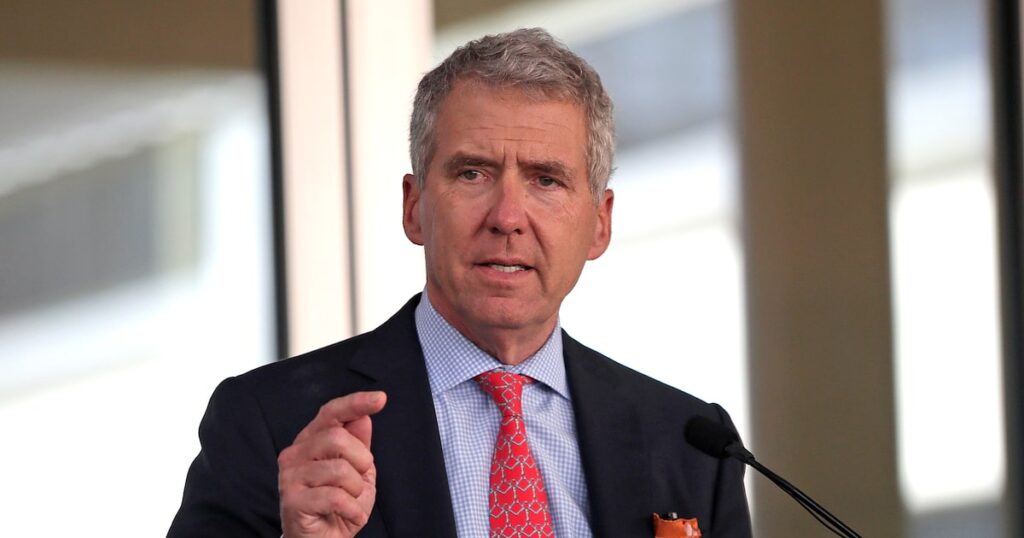University of Texas System Chancellor James B. Milliken is leaving to be the next president of the University of California.
UC officials announced Friday afternoon that Milliken will lead that system, which has more than 295,000 students and 10 campuses as well as health centers and research labs.
His departure comes as other longtime leaders in the system are leaving as well, including UT-Austin President Jay Hartzell and UT-Dallas President Richard Benson.
“The University of California is universally regarded as the preeminent public research university in the world, and I am deeply honored to have an opportunity to join the many talented faculty, staff, and campus leaders in their vital work,” Milliken said in a release.
“It is more important than ever that we expand the education, research, health care, and public service for which UC is so widely admired and which has benefited so many Californians.”
Milliken’s move comes as Texas lawmakers debate a major overhaul at public universities that would shift more control over what’s taught and who is hired to politically connected regents.
Related:Academic freedom, DEI: Texas colleges face major overhaul this legislative session
UT regents named John Zerwas, executive vice chancellor for health affairs, as the system’s acting chancellor, according to a release. Milliken will remain chancellor until May 30. He takes over the UC system Aug. 1.
In 2018, Milliken, a former chancellor of the City University of New York and former president of the University of Nebraska, was tapped to lead the Texas system.
As chancellor, Milliken oversaw 256,000 students across 14 campuses, including seven medical schools. UT enrolled record-high numbers of students under his leadership. Annual research expenditures across the system neared $5 billion, ranking second in the nation.
Milliken emphasized increasing access to higher education for low-income and first-generation students.
“We need to do a better job of providing access to the social and economic opportunities of higher education,” he told The Dallas Morning News in 2019.
“I tell people within university communities that I speak to that tuition is not going to be free,” he said at the time. Still, “we should raise more private money and do everything we can to hold costs down.”
Last year, UT announced a groundbreaking financial aid program that offers free tuition to students whose families make less than $100,000 annually, expanding college access for Texans.
Related:‘Game changer’: UT System announces free tuition for qualifying Texas families
“We are fortunate to have had Chancellor Milliken at the helm of the UT System for almost seven years,” UT Regents Chairman Kevin Eltife said in a Friday release. “The board and I are grateful for our close and very productive relationship with him, and we are proud of what we accomplished together. He has led the UT System admirably and innovatively.”
In a release, current UC President Michael V. Drake said Milliken has the “depth of wisdom and experience to handle the challenges and opportunities” of the presidency.
Texas higher education institutions are under increased scrutiny following a 2023 state law that bans diversity, equity and inclusion efforts at public colleges and universities.
UT closed 21 DEI offices, eliminated 311 DEI-related jobs and canceled 681 contracts, Milliken said in a 2024 Senate hearing. The cuts saved $25 million, he said.
Milliken will take over a system that has taken an outsize role amid Trump’s higher education targets, The Los Angeles Times reports.
UC is under federal investigations into alleged antisemitism against employees, stemming from accusations against widespread pro-Palestinian protests and encampments last spring, the Times reported.
Federal lawyers are also probing the selective UC admissions process, claiming it illegally considers race in admission, according to the outlet.
California, with the support of UC, is among the Democratic-led states that have sued the administration over cuts to higher education funding, including a slashing of billions in National Institutes of Health grants, the Times reported.
The DMN Education Lab deepens the coverage and conversation about urgent education issues critical to the future of North Texas.
The DMN Education Lab is a community-funded journalism initiative, with support from Bobby and Lottye Lyle, Communities Foundation of Texas, The Dallas Foundation, Dallas Regional Chamber, Deedie Rose, Garrett and Cecilia Boone, Judy and Jim Gibbs, The Meadows Foundation, The Murrell Foundation, Ron and Phyllis Steinhart, Solutions Journalism Network, Southern Methodist University, Sydney Smith Hicks, and the University of Texas at Dallas. The Dallas Morning News retains full editorial control of the Education Lab’s journalism.


